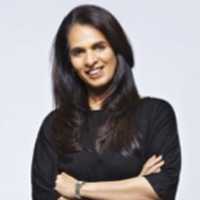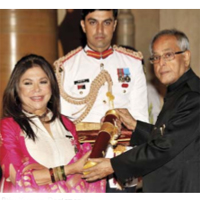Retail is witnessing the rise of a new breed of women who are surmounting every challenge, assuming C-suite positions and leading by example. By doing so, they serve as beacons of hope for women across the nation who aspire to build successful and fulfilling careers in retail.
Today, a woman’s role in society has far transcended that of a homemaker; she is now a primary decision maker. Her opinion is absolutely pivotal to decisions centred on everything from healthcare and banking to electronics, automobiles and the environment. What’s more, a significant amount of erstwhile male-targeted companies have realigned themselves to target women, owing to the sheer purchasing power that they yield.
Retail is undeniably the industry with the largest female customer base. Be it department stores, supermarkets or apparel stores, every piece of communication they disseminate mostly refers to the customer as ‘she’ irrespective of the product category. Women have begun to realize that as the primary drivers of the consumer side of retail, it makes logical sense for them to drive the business side of it too and create a conducive environment that will inspire more women to join the industry…
REINSTATING WORK-LIFE BALANCE
A major deterrent for women in retail is the work hours. While jobs in other domains like Media, Advertising, Marketing and Production also tend to be hectic and erratic, Retail is one of those industries where the work hours are undefined and 9 to 5 work timings could eventually result in 9 to whatever time. This can be attributed to the fact that most consumers primarily shop post office hours or on holidays, which in turn means late nights and almost no days off for employees in this domain.
Here are some things that some of the top women in the retail sector say, to buoy their brethren…
1. CEO Rush Fitness, Ritu Agarwal

“Unfortunately, women in India tend to be stereotyped into the categories of either marketing or finance at the operational level, leaving very little room for growth in leadership roles. The more coveted positions with hard core operational management of the retail chain go to the men. This is based on the perception that such roles require long hours in so-called unfriendly environments for women.”
“Retail, much like the rest of corporate India, tends to operate on the perception that there are certain tasks which women should not or rather would not involve themselves in. It is automatically assumed that women will not be part of any process that pertains to tasks like rental negotiation, contracting, supply chain, logistics, data mining and the like. This, however, is a misconception”.
“The very fact that we are beginning to see women in leadership positions in corporate India is a clear sign that mindsets are changing and boardrooms are making way for women at the table.”
“In my opinion, one should take cues from the financial sector of inducting women at the grass root levels of the organisation with a clear path to attaining leadership roles. A leader is one who should make it to the position based on pure merit. This is only possible based on a strong premise of unbiased opportunities at an entry level for both sexes to have an equal shot at a clear career path.”
2. Executive Director, Marketing at Samsonite South Asia Pvt. Ltd., Anushree Tainwala

“My brand manager for Samsonite was on maternity leave when the brand was facing turmoil. I ensured that the entire brand team worked out of her home. Performance should be judged on the basis of quality of the job done and not on how many hours have been clocked.” she says.
“Women today are becoming more ambitious, more demanding, more open about calling out any sort of discrimination that exists in the industry. In Samsonite, say in 2008, we had few women working in senior management positions, whereas today we have at least 10 -12 female colleagues in senior management.”
3. CEO of TRRAIN Ameesha Prabhu

“We need to embrace new ways of working and use technology to facilitate this, and few companies are successfully doing this as it’s not the number of hours that matter but the final output and delivery.”
Prabhu says that her own success story, though written by her, was aided greatly by her mentors who encouraged her to stay curious, believe in herself, make mistakes, innovate and take calculated risks. She cannot state enough the importance of forging strong relationships with customers, vendors, partners and internal stakeholders.
“I believe that all that I have achieved has been made possible not because I did it right but because I did it with the right people. I am very passionate about retail and anything to do with retail, consumer, trends, experience excites me. This passion helps me connect with the most important stakeholder in retail i.e. the customer. It is also a very important ingredient for success in a retail career. And finally, purpose comes, when you align yourself with the company’s objectives and decide to work towards achieving that objective to your maximum capacity, leaving no stone unturned.”
4. Managing Director at Godrej Nature’s Basket, Avani Davda

“Godrej has been at the forefront of this change with various initiatives undertaken under its ‘Diversity and Inclusion’ vertical. A host of initiatives and benefits offered include a daycare facility, six-month maternity leave and flexible working hours for mothers, career 2.0 for women who want to make a comeback after a sabbatical, among others.”
“Crucial to improving women’s representation at the workplace is accommodating their career lifecycle and creating policies that will encourage more women entering or re-entering the workforce. Also, women entrepreneurs can benefit immensely from favourable government policies, training programmes and access to financial support and working capital.”
5. CEO of Priority Marketing, Manisha Sanghani

Manisha Sanghani is a maverick who has managed to defy convention, battle the odds and navigate the hierarchical structure to achieve monumental success in the retail world. In a span of 10 years, she has successfully launched and marketed 18 international watch brands in India. She is the only Indian woman entrepreneur/owner in the watch industry to own two Intellectual Property Rights brands, namely, Just Watches and Just in Vogue in addition to owing her own watch brand called Aspen Watches, which she launched to celebrate the young independent Indian woman.
“For me, adversity has been an opportunity to recognize my abilities and learn. I believe that every error and stepping stone in life is the learning curve you require to create a brilliant history of triumph.”
She staunchly believes that while retail may currently be a testosterone-fuelled industry, especially where boardroom positions are concerned, women tend to make more effective retailers owing to an innately strong aesthetic sense and the keen ability to discern correct stock to sale ratio, correct merchandising and get maximum return on space.
“Women are more resilient, can handle financial temerity, have lower egos and are more sensitive to both their customers as well as their teams. What’s more, women are naturally inclined towards building great relations with partners”.
6. Concept Head at Foodhall, Avni Biyani

“It’s important to understand the business very well. Whether you have exposure outside of the family business or not, what really matters is that you understand your customer. And that happens only after spending a lot of time in the stores.”
7. Managing Director of VIP Industries Pvt Ltd., Radhika Piramal

In 2009, when Radhika took over as MD, she came with a strong insight: handbags, backpacks and office bags are purchased more often than luggage. The fact that VIP had erstwhile never specifically targeted the largest retail consumer base, namely, women, further augmented this insight. After formulating a clear brand segmentation and distinct portfolio strategy, she began offering consumers exclusively designed handbags, backpacks and office bags under the brand Caprese. This strategic decision not only opened up an entirely new market for VIP but also served to further strengthen its leadership position.
8. Founder of the House of Anita Dongre, Anita Dongre

Anita redefined bridal wear with a unique, yet simple insight in mind – at weddings the guests end up having more fun than the bride. To remedy this issue, she created elegant bridal wear with comfort at its core. From designing lehengas with handy pockets for phones and tissues to flowing lightweight georgette foils and chiffons, she has made it possible for a bride to let her hair down and join in the revelry on the most important day of her life. Furthermore, she was responsible for reviving interest in Indian handloom and textile craftsmanship through her Grassroots collection which has struck a chord with youngsters and adults alike.
9. Fashion Designer, Ritu Kumar

Ritu Kumar, who founded her ever popular label Ritu Kumar, is one such woman. She built her label on the premise that India needed to find its own identifiable voice in the world of fashion. She was the nation’s first designer to put India’s bridal couture on the contemporary radar internationally. By fusing traditional textures and modern embellishments she created collections that are refreshing and truly path-breaking in this space.
10. Co-Founder and Director of Corporate Development, Neeru Sharma

Neeru founded online shopping portal Infibeam.com at a time when startups weren’t quite as common as they are today. Her stroke of genius was to operate on a very unique business model which positioned the portal as both a pure-play ecommerce site as well as a platform infrastructure offering, called buildabazaar, which is being used by over 19,000 merchants, retailers and brands all over India and internationally.
She is of the firm belief that passion, diligence and clarity are what have helped her succeed as an entrepreneur; the fact that she is woman makes it neither easier nor harder in any way.
Her personal philosophy is “Chase your dreams till they become true!” and to achieve this she believes in smart, not just hard work. She signs off by saying, “effective delegation and time management help rejuvenate your energies and get you ready for another productive day.”
11. CEO and Co-Founder of Zivame, Richa Kar

When Richa she realized that women who shopped online for lingerie needed assistance and that such a company didn’t exist, she set out to launch her own, and has never turned back since. The journey was not paved in gold and the challenges she faced were far beyond imagination. Everything from incorporating the company and getting a payment gateway to renting office space proved to be a herculean task – the most difficult one being the Indian discomfort with the category – but she ploughed on relentlessly.
Today, it is this very battle to eliminate the taboos surrounding the category that motivates her to achieve more, every single day. With a category like lingerie, fitting is of utmost importance. This is a concept that is rarely understood or given priority.
Richa’s consumer research further revealed that 4 out of 5 women end up buying ill-fitting lingerie. This led to the creation of a second bold new concept called the ‘Fitting Lounge’, which was extended to the brick-and-mortar arena. Here, a customer simply has to book an appointment and drop in to discover products that offer the right fit in total privacy and under the guidance of an expert. The products are then ordered online and conveniently delivered to the customer’s address. An essential need met by a simple solution!
12. Founder and CEO of LimeRoad, Suchi Mukherjee

Online shopping portal Limeroad is yet another example of how only a woman perfectly understands another woman’s needs, wants and desires. Suchi instinctively knew that women are more drawn to visual experiences and respond more favourably to visual cues. All of this culminated in an epiphany while she was flipping through the pages of a women-centric lifestyle magazine. She realized that no consumer technology existed at the time which made the discovery of products easy and entertaining. She set out to create a portal that makes product discovery more fun and experiential, akin to reading a magazine or flipping through photos in an album.
During the process of building LimeRoad, she also observed that a retail consumer had no real place from where she could access the massive range of products that was being manufactured and shipped out of South-East Asia, the world’s largest manufacturing hub.
Today LimeRoad, which was India’s first social visual web platform, has some of the highest engagement metrics on social platforms relative to all other web 1.0 e-commerce sites in India.








